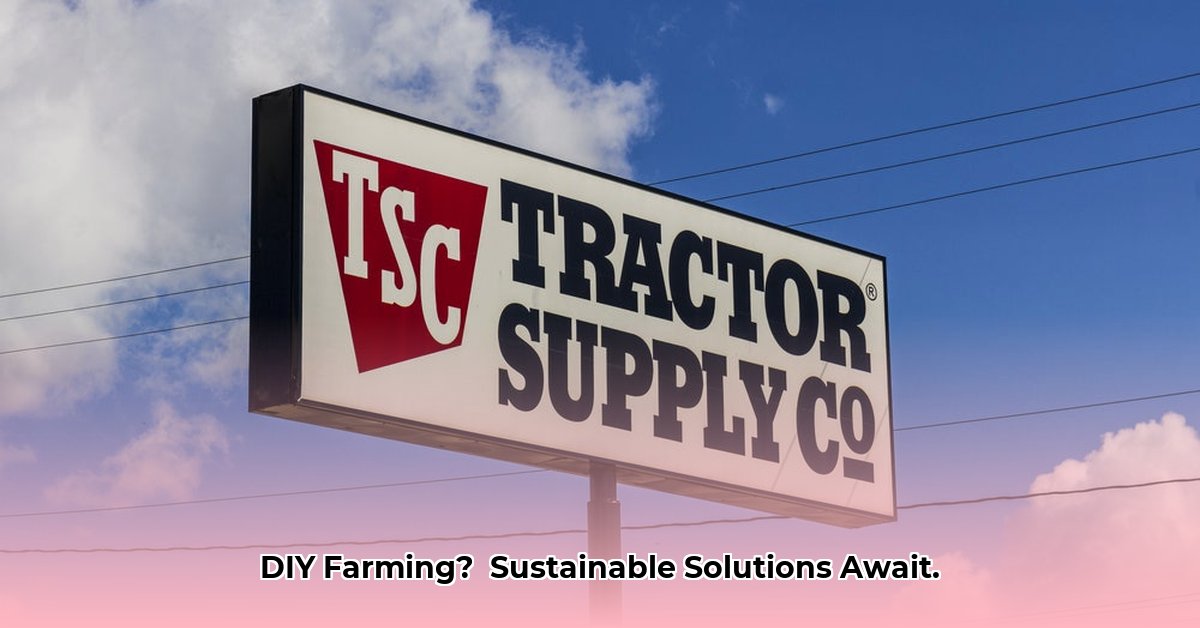
Growing Your Own Way: Bonham Tractor Supply and the Rise of the DIY Farmer
Imagine Sarah, a Texas farmer, her hands gently turning soil in a sun-drenched field. This isn't a massive industrial farm; it's a testament to the burgeoning DIY farming movement – individuals taking control of their food production, often with assistance from their local Bonham Tractor Supply (TSC). This story embodies independence, resourcefulness, and a growing desire for more sustainable food systems. But how realistic is this ideal, and what does it mean for the future of agriculture? For more information on food preservation techniques, check out this helpful resource on food dehydrators. This article explores the role Bonham Tractor Supply plays within this dynamic and complex landscape. We'll examine the benefits and drawbacks of DIY farming, its environmental implications, and how we can collectively contribute to a more sustainable agricultural future. We'll also provide practical tips for farmers, drawing on resources available at TSC, to aid in making environmentally conscious decisions.
The DIY Farmer's Dilemma: Pros and Cons of Independent Agriculture
The DIY farming movement presents several compelling advantages. It fosters a deeper connection between food and its source, allows greater control over farming methods, and can potentially stimulate local economies. Smaller, localized farms often lend themselves to more sustainable practices, such as reduced fertilizer and pesticide use. However, this path isn't without its challenges. DIY farming typically demands significant upfront investment in equipment and land, creating a substantial financial barrier to entry for many aspiring farmers. Furthermore, access to crucial information and training is essential for success and sustainability. While TSC and similar retailers offer many products, farmers often need supplementary knowledge from external sources. Critically, the success of individual farms doesn’t automatically translate to broad environmental sustainability; widespread adoption of unsustainable methods by numerous farmers still results in substantial cumulative environmental impact.
| Advantage | Disadvantage |
|---|---|
| Stronger connection to food | High upfront investment |
| Greater control over practices | Limited access to resources & information for some |
| Potential economic benefits for local communities | Requires significant knowledge and skills |
| Opportunities for sustainable techniques | Success doesn't guarantee broad environmental sustainability |
Bonham Tractor Supply: A Partner in Sustainable Farming?
Bonham Tractor Supply, alongside other agricultural supply stores, plays a crucial role in supporting DIY farmers by providing necessary equipment, seeds, and other resources. However, their influence on sustainable agriculture depends significantly on the choices they make. Do they prioritize suppliers employing eco-friendly manufacturing processes? Do they actively promote sustainable farming methods and products?
Some experts believe TSC and similar retailers could significantly enhance their contributions to sustainability by:
- Prioritizing Sustainable Sourcing: Actively seeking and showcasing products made from recycled materials and sustainably harvested resources.
- Reducing Packaging Waste: Adopting more eco-friendly packaging and encouraging customer recycling.
- Educating Farmers: Offering workshops and online resources on sustainable farming practices (soil health, water conservation, pest control).
- Supporting Local Initiatives: Partnering with local organizations promoting sustainable agriculture and environmental stewardship.
- Transparent Supply Chain: Publicly documenting and sharing progress towards sustainable practices within their supply chains.
Practical Steps for Sustainable Farming: A Guide for DIY Farmers
Here’s how DIY farmers can integrate sustainable practices, leveraging resources from Bonham Tractor Supply or similar stores:
- Optimize Water Usage: Invest in water-efficient irrigation systems (drip irrigation). Regular soil moisture checks ensure efficient water use, minimizing waste. TSC offers a variety of such systems.
- Smart Fertilization: Use soil testing kits (available at TSC) to determine nutrient needs, preventing over-fertilization and minimizing environmental impact.
- Natural Pest Control: Explore organic pest control methods. Your local TSC may offer natural pest-control solutions. Consider companion planting to naturally deter pests.
- Responsible Waste Management: Properly dispose of chemicals and packaging materials. Recycle whenever possible. Many TSC stores have established recycling programs.
- Continuous Learning: Attend workshops, read agricultural publications, and join online forums to stay abreast of best sustainable farming practices.
The Future of Farming: Collaboration for a Greener Tomorrow
The future of sustainable farming depends on collaboration. DIY farmers, agricultural supply stores like Bonham Tractor Supply, government agencies, NGOs, and research institutions must work together. Governments can support sustainable farming through financial incentives and policies. NGOs and universities can provide research and training programs. Agricultural supply stores can focus on offering sustainable products and education. A holistic approach—supporting both individual farmers and broader environmental goals—is crucial for a future of food security and environmental stewardship. The challenges remain, but a more sustainable food system is within reach.